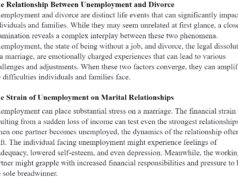SPONSORED CONTENT
Parents owe it to their children to provide them with the necessary care and attention that they require. This provision of care is irrespective of whether the parents are living together, separated, or divorced. Child support in the United States is usually collected from the parent with a higher income level to reduce the pressure on the parent with the lower income.
“It is ethical for parents to provide for their minors even if the relationship or marriage with their partners did not work out,” says Galit Moskowitz of Moskowitz Law Group, LLC. The decision of which parent pays child support and how much the parent must pay depends upon the parents’ income.
Not all money received by parents qualifies as income. What makes it to the income list differs from state to state. If you are involved in a child support case, you may need to engage the services of a qualified social security lawyer to handle such a case.
What is Child Support, and How Does it Work?
Parents are required to provide emotional and financial support for their children until they reach the age of eighteen. This obligation stands even when a parent is not living with their child/children or shares the responsibility of care with another person.
Child support is most times paid for by parents in adherence to a court order. Some of the common forms that child support can take are tuition, child care, medical care, and other forms of financial aid. The money serves to offset some of the costs involved in raising a child.
Paying Child Support as a Government Assistance Program Recipient
When a parent is a beneficiary of a government assistance program such as Supplemental Security Income or Social Security Disability Income, paying child support may add additional strain on them. This is because the allowance paid from these assistance programs is barely enough for the parent to survive off of and may not be sufficient to pay child support.
Therefore, a parent tasked with the responsibility of paying child support may not be compelled to do so if they are recipients of supplemental security income. However, parents who are recipients of SSDI can pay child support through a court order. What happens is that the benefits are made out to the child and can be considered to be the parent paying support.
How SSI Works
A thorough explanation of how SSI works will make the restrictions on child support payments for beneficiaries more understandable. Supplemental security income is almost the same as an SSDI. The significant difference between the two programs is that beneficiaries on SSI are not required to earn work credits before qualifying for it.
Beneficiaries of the SSI programs are individuals who are disabled or are above the age of 65. The benefits paid by the assistance program are barely enough to cater to the beneficiary’s needs. Even though the court may order that they pay for child support, they cannot enforce it.
The SSI is not recognized as a real income when calculating child support. Therefore, beneficiaries are under no obligation to pay child support with the benefit.
Explaining the Social Security Disability Income
Social security disability income is a government assistance program that is restricted to disabled workers who, before their disabilities, were able to earn a livable wage. During the period of active work, beneficiaries must have paid social security taxes to qualify for this type of assistance.
The benefits paid to the beneficiary are typically dependent upon the amount they earned when they were actively working. If a recipient worked longer hours, they will likely receive more SSDI.
Therefore, one can be ordered by the court to pay child support from the income from SSDI if the benefit amount is high enough. However, before the court arrives at this conclusion, the parent’s benefit amount will have to be considered.
Are there Penalties for Defaulting on Child Support?
Conversely, failing to pay child support may lead to the court enforcing the payment. Other consequences can result from non-compliance in paying child support such as seizure of property, court injunction mandating the payment of the total amount owed, and withholding the parent’s tax refund.
Conclusion
While the SSI and SSDI payments may not amount to much, beneficiaries can opt out of paying child support or pay child support through their benefits. To do so, one may need to consult with a social welfare lawyer who will advise on the best way to approach the situation.



 Sign up for the Blue Virginia weekly newsletter
Sign up for the Blue Virginia weekly newsletter








